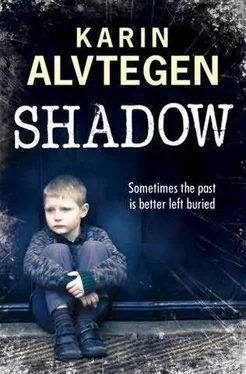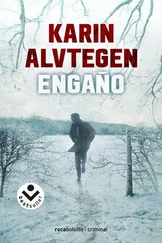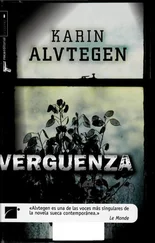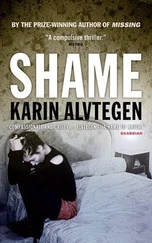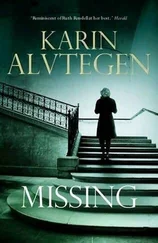
First published in Sweden in 2007
2009

To my family,
the very foundation
‘ W hen you hear the tone – ding-a - ling – it means it’s time to turn the page. Now we’ll begin. ’
The voice on the tape had changed. It almost sounded like a man now, although he knew it was a lady. Once again he opened the Bambi book to the first page and listened to the story on the tape player. He knew it by heart. He had known it for a long time, but today he’d listened so many times that the lady’s voice was beginning to turn dark.
It had begun to grow dark around him as well; not as many mammas and pappas with kids and balloons were coming by any more. He was hungry. The buns he’d been given were all eaten up and the juice had made him want to pee, but she had told him that he should stay here, so he didn’t dare move. He was used to waiting. But he really had to pee now, and if she didn’t come and collect him soon he might wet himself. He didn’t want Mamma to get that look. The one that made him hurt and sometimes made her leave him alone in the dark. He put his hand on the sore spot he’d got yesterday when he didn’t want to go with her. Her eyes had turned so angry and she’d told him he was being naughty. And then his back had hurt. She wanted to go to that house so often. First take the bus and then the long walk. Sometimes she stayed with him out there, but sometimes she was gone for a long time, and he wasn’t allowed to bother her. There was a strange house of glass in the garden where it was rather fun to play, but not all the time and never alone. There was a little shed with wood in it too, where he could carve things even though he wasn’t allowed to play with knives. Sometimes she took such a long time it got dark. Then the ghosts came creeping out, and the thieves. The knife in the woodshed was his only protection. And the magic floorboard with the dark spot that looked like an eye. If he stood on it with the knife in his hand and sang ‘Twinkle, twinkle, little star’ then they couldn’t get at him. Before, she used to say they were going to live in that house someday, not in the glass house or the one with the wood, but in the big one, and then he would have his own room. Everything would be all right then, she said.
He looked around. He was sitting at the top of a wide staircase, and behind him there was a pond with birds in it. For a moment he wondered whether he dared leave his spot and walk up to have a look, but he remembered what he’d been told and stayed right where he was. The stone step began to feel cold. The voice on the tape player was speaking more slowly now. It almost sounded like she was falling asleep inside. Finally the button popped up and the voice stopped altogether. He suddenly felt lonely. And soon he wouldn’t be able to hold it any longer. He didn’t know where there was a toilet, and now he began to feel a little sad too. He didn’t want to sit here any more. He had waited so long and now he had to go and pee and after that he wanted to leave.
‘ Hi. ’
He jumped at the sound of the voice. In front of him stood a man dressed in green. It looked like he was wearing a police uniform but it was the wrong colour. There was writing on his chest just like a policeman’s shirt.
‘ What’s your name then? ’
He didn’t answer. Mamma had told him never to talk to strangers, and he lowered his eyes and stared hard at the stone step.
‘ We’re closing now, so it’s time for everyone to go home. Where are your mamma and pappa? ’
The man’s voice didn’t sound angry. It sounded rather nice, but he knew he wasn’t allowed to answer. At the same time he couldn’t be rude, and suddenly he didn’t know what to do. Two big drops landed at his feet, making dark spots on the stone. And then two more.
‘ Are you here with your mamma or pappa? ’
He shook his head slowly. That way he wouldn’t have to talk.
‘ So who are you here with? ’
He shrugged his shoulders.
‘ Don’t be sad. My name is Sven and I’m the guard here at Skansen amusement park. Anybody who needs help in here can come to me. If you’ve lost your parents or can’t find your way or need help. ’
It was quiet for a moment .
‘ How old are you? ’
Cautiously he held out the fingers of his left hand, and with his other hand he folded down his little finger and thumb.
‘ Are you three?? ’
He shook his head a little.
‘ No, four. ’
He clapped his hand to his mouth. Now he’d spoken to him. What if the old man told his mamma?
He sat in silence, his eyes fixed on the ground. Then he glanced at the man to see if he looked like somebody who would tell. The man smiled at him.
‘ If you want, you can come with me to the little house down there where I work. We can wait there until they show up. ’
He had to pee so badly. Soon he was going to wet himself, and then Mamma would be even angrier.
‘ I need to pee. ’
The man nodded, still smiling.
‘ The toilets are down there. You run along, and I’ll watch your things. Do you see the door there? ’
He hesitated a moment before doing as he was told.
Sven Johansson waited on the steps, concerned as he watched the little boy running off towards the toilets. He had noticed him earlier that afternoon, and now he was worried. When the boy disappeared into the toilet, he squatted down and had a look at his belongings. A tape player, a Bambi book, a clear plastic bag with crumbs in it, and a small juice bottle with a yellow plastic top and a few drops of juice left inside. He opened the book to see if the boy’s name was written in it. A folded piece of paper fell to the ground. With a sense of foreboding he unfolded it and his worst fears were confirmed. The brief message was written in a flowing script:
‘ Take care of this child. Forgive me. ’
The key to the flat had arrived in a padded envelope from the police. A brown-veneered door in an old-fashioned stairwell that had been gnawed by time. Gerda Persson had lain dead for three days by the time the home help discovered her body. After ninety-two years and a little more than three months she had filled her lungs one last time and turned into a memory. That was all Marianne knew. And since she was the one now standing outside the door of the flat, it was also clear that neither the police nor the home help had managed to find any relative who could take care of all the details required when a life came to an end. That was why the task had landed on Marianne Folkesson’s desk. A stranger’s key to an unknown life whose past she’d been assigned to retrieve.
She had been in the neighbourhood before. The blocks were full of small flats, and many of their residents were in contact with Social Services’ care for the elderly. Sometimes, when one of them died, there was no one to contact. No one except the district commission’s estate administrator, Marianne Folkesson.
She opened her bag and took out the thin plastic gloves, but left the mask. She never knew what awaited her behind these strangers’ doors, but out of respect for the deceased she tried to go in with an open mind. Sometimes the home was as neat as a doll’s house, left to posterity in spotless condition, with meticulously cared-for possessions that no one would ever want. But sometimes among the belongings that filled the home of the deceased there was an inexplicable feeling of presence . In a way, her own arrival was an encroachment, and she didn’t like to make it worse by wearing an ugly mask. She preferred to think of herself as an ally, come to close up with respect and dignity the lives hidden behind the unfamiliar names that landed on her desk. To gather the objects she found, and if possible locate the people to whom they would mean something. Death was no longer something that scared her. After twenty years in this job she had realised that it was a natural part of life. She no longer sought the meaning of life, but that didn’t mean she thought she had found it. Since the universe had taken the trouble to exist, there must be a reason for it. And with that she had to be content, willing to trust in the mystery.
Читать дальше
